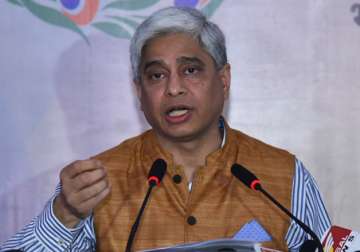Comments show "attachment to terrorism”, India reacts to Pak’s reaction on Kashmir
the Home ministry today reacted sharply to the remarks from across the border, saying Pakistan has no right to comment on India’s affairs and that it should look after its own state of affairs.

New Delhi: India on Monday reacted sharply to Pakistan's strong comments on Kashmir situation in the wake of killing of militant Burhan Wani, saying that it reflect its continued "attachment to terrorism and its usage as an instrument of State policy."
India also asked Pakistan to refrain from interfering in the internal affairs of its neighbours.
"We have seen statements from Pakistan on the situation in the Indian state of Jammu and Kashmir. They reflect Pakistan's continued attachment to terrorism and its usage as an instrument of State policy," External Affairs Ministry Spokesperson Vikas Swarup said.
Pakistan is advised to refrain from interfering in the internal affairs of its neighbours," Swarup said.
Earlier in the day, the Home Ministry asserted that the developments in Jammu and Kashmir are matters internal to India and said Pakistan has no right to comment on India’s affairs and that it would be better off concentrating on its own problems.
“If Pakistan is so concerned about human rights, it should look into the mistreatment meted out to the Kashmiris in Pakistan Occupied Kashmir at the hands of the Pakistan army. India is a democratic country. Pakistan has no business commenting on matters related to India,” Union Minister of State for Home Affairs Kiren Rijiju said today.
Pakistan expresses shock
Pakistan has expressed ‘shock’ over the killing of Hizbul Mujahideen commander Burhan Wani in an encounter in Kashmir and deplored "oppressive measures" and "excessive" force used against civilians in the latest wave of violence in the Valley.
Prime Minister Nawaz Sharif, who has been under attack from the opposition for remaining "silent" over the killing of protesters in Kashmir, came out with a late night statement condemning the action of Indian security forces.
"The Prime Minister of Pakistan has expressed his deep shock at the killing of Kashmiri leader Burhan Wani and many other civilians by the Indian military and paramilitary forces," Sharif's office said in the statement.
The Prime Minister said it was "deplorable that excessive and unlawful force was used against the civilians" who were protesting against the killing of Wani.
"Oppressive measures such as these cannot deter the valiant people of Jammu and Kashmir from their demand of exercising their right to self-determination in accordance with the UN Security Council resolutions," he said.
Expressing concern over the detention of Kashmiri separatist leaders, Sharif said India should fulfil its human rights obligations as well as its commitments under the United Nations Security Council resolutions.
Big setback to militancy
Meanwhile, the MHA, which earlier met under the chairmanship of Home Minister Rajnath Singh to take stock of the situation in Kashmir, said that the death of Burhan Wani has come as a big setback for home grown militancy.
“He was becoming an icon. Him (staying) alive would have attracted more youth to militancy than him being dead,” a Home ministry source said.
The MHA further said that the encounter that led to Burhan’s death was genuine and that arresting him or getting him alive was extremely difficult.
Notably, there has been a sharp increase in the number of terrorists being neutralized this year as compared to the previous year.
Restraint against civilians
Following the widespread violence that emanated after the death of the Hizbul commander, the MHA has advised security officials to exercise restraint. The forces have been told that the use of force against civilians needs to be restricted to the minimum.
While asserting that there cannot be any compromise on terrorism, the MHA has also expressed concerns over many protesters coming out in support of the militants. “People need to be placated. Their issues need to be addressed,” an MHA official said, adding that a political decision should be taken to reach out to youth and provide them employment.
Unprecedented violence
The violence in the Valley has so far claimed 23 lives including that of a policeman. While security forces had anticipated violence in Tral and Pulwama, the kind of widespread violence witnessed was not expected.
The MHA has said that stone pelters who are teenagers (13-19) should be dissuaded by parents to indulge in stone pelting. Granting amnesty to first time stone-pelters is a step in right direction, it added.